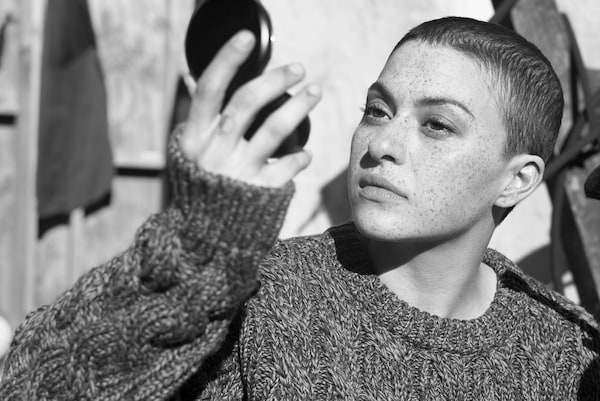Shako Mako
by Hailey Gates
“Farah,” a bread seller, walks the streets of a Middle Eastern town, while an American military vehicle, surrounded by soldiers, slowly passes by. A moment’s silence. Then, a devastating explosion. Civilians are bloodied, wounded. The horrors of war. “Farah” looks around aghast and wailing. But nothing here is quite what it seems. In fact, “Farah” is a character played by an aspiring actress called Laila. And this isn’t Iraq, but a replica village erected on the Fort Irwin army base in California, used to train American troops before being sent abroad. Laila believes her acting talents are being wasted away in this arid simulation, where female role-players are limited to mute, background roles. She takes things much more seriously. Laila plots her way out.
SHAKO MAKO, directed by Hailey Gates, is the 17th commission from Miu Miu Women’s Tales. The acclaimed short-film series invites today’s most profound and original female directors to investigate vanity and femininity in the 21st century.
Based in New York, Hailey Gates is an American writer, actress, model and journalist who grew up in Los Angeles. After graduating from the Experimental Theatre Wing at the Tisch School of Arts, Hailey worked at The Paris Review. She left to host the VICELAND docu- series States of Undress, which saw Hailey travel around the world, often to conflict zones, to report on the social dimension of fashion weeks in politically fraught settings. Hailey has also acted in David Lynch’s acclaimed reboot, Twin Peaks: The Return and the feature Ricki and the Flash, starring Meryl Streep. Alongside artist Tom Sachs, Hailey co-wrote and produced the docu-drama A Space Program. And Hailey also modeled for Miu Miu’s campaign entitled “Subjective Reality.”
About the impulse behind Shako Mako, Hailey says, “I became fascinated by instances of people acting, but in real life, and how that affects the psyche and your emotional state. This type of military exercise was innovated by a TV producer. I thought it was so interesting that we were sending soldiers to Iraq and training them in a Hollywood-esque facility.” Hailey wrote the lead Laila specifically for actress Alia Shawkat, whose father is from Baghdad. “It’s a role I’ve always hoped to play,” says Alia, “an actress who wants a part too much? I can relate to that. And I feel really lucky to be able to connect to my heritage this way.”
“Miu Miu has always represented irreverence, strength and a sense of humor. Those are things I hold very dearly,” admits Hailey, and feels honored to contribute to the ongoing project: “So many of my heroes have directed Women’s Tales before me.”
Shako Mako doesn’t shy away from difficult issues⎯the theatrics of war, lazy ethnic stereotypes, Islamophobia⎯but instead narrates this intensely macho scenario from the perspective of the women present, who are, without exception, smart, witty, inventive and⎯to use that word again⎯irreverent.
Previous Women’s Tales are: The Wedding Singer’s Daughter by Haifaa Al-Mansour; Hello Apartment by Dakota Fanning; (The [End) of History Illusion] by Celia Rowlson-Hall; Carmen by Chloë Sevigny; That One Day by Crystal Moselle; Seed by Naomi Kawase; Les 3 Boutons by Agnès Varda; De Djess by Alice Rohrwacher; Somebody by Miranda July; Spark and Light by So Yong Kim; Le Donne della Vucciria by Hiam Abbass; The Door by Ava DuVernay; It’s Getting Late by Massy Tadjedin; The Woman Dress by Giada Colagrande; Muta by Lucrecia Martel; and The Powder Room by Zoe Cassavetes.





















Photos by Brigitte Lacombe









